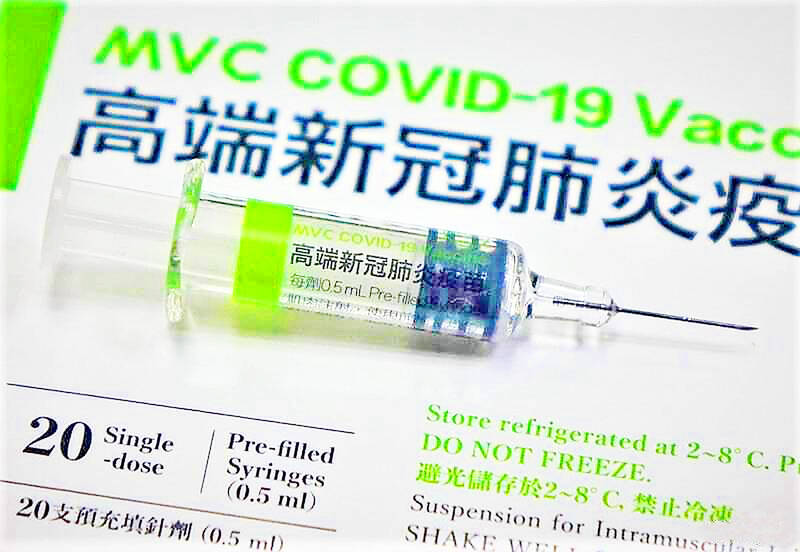The Legislative Yuan yesterday passed a motion to hold a special session today to question Premier Chen Chien-jen (陳建仁) and the Cabinet about the government’s acquisition of the COVID-19 vaccine made by Taiwan-based Medigen Vaccine Biologics Corp (高端疫苗).
Opposition lawmakers have asked Chen to publicize the government’s purchase agreement with Medigen, while he and his colleagues are expected to face questions about whether the agreement was appropriate and in the public interest.
The Chinese Nationalist Party (KMT) proposed the motion on Wednesday last week, two days after Vice President William Lai (賴清德), the Democratic Progressive Party’s (DPP) presidential candidate, said in a debate that he agreed with the request to publicize the purchase agreement.

Photo: Tsai Szu-pei, Taipei Times
The Food and Drug Administration on July 19, 2021, granted the Medigen-developed vaccine emergency use authorization, a decision some considered controversial as the pharmaceutical company had not yet completed phase 3 clinical trials.
Instead, the results of the vaccine’s phase 2 trial were analyzed using immunobridging, which infers the vaccine’s overall level of protection based on immune responses in clinical trial participants.
KMT presidential candidate New Taipei City Mayor Hou You-yi (侯友宜) yesterday said that Minister of Health and Welfare Hsueh Jui-yuan (薛瑞元) colluded with Lai’s campaign to cover up evidence related to controversies over the government’s acquisition of the vaccine.
“It has been 10 days since we had our televised debate, and there has been no response from Lai about this matter. Instead, we see the minister of health and welfare secretly attend a meeting at Lai’s campaign headquarters. Were they working on their testimony together or trying to destroy evidence?” Hou said in response to requests for comment about Chen’s scheduled briefing to the legislature.
“The DPP waited until now to deliberate this matter at the legislature. They should have disclosed details of the contract as quickly as possible, given that people have so many questions about the procurement process,” Hou said on the sidelines of a campaign event in Tainan.
Cabinet spokesman Lin Tze-luen (林子倫) defended the government’s purchase of the Medigen vaccine, saying that all COVID-19 vaccine procurements were carried out in accordance with regulations and common practices in the international community.
“Sixty-three cases have been filed in the past two years about alleged illegalities in the government’s acquisition of COVID-19 vaccines. Following investigations, prosecutors found no evidence to support any of these accusations and dismissed the cases,” Lin said.
“It is regrettable that members of opposition parties continue to ignore the truth and spread rumors about the procurement process,” he added.
Taiwan is not the only country that signed contracts with vaccine manufacturers containing confidentiality clauses, he said.
“The government, as one of the signing parties, needs to adhere to the terms of the contract. Given that opposition parties are continuing to use this to distort people’s understanding of the situation, we are communicating with vaccine manufacturers to disclose the contracts,” he said.
However, whether contracts could be disclosed publicly depends on the vaccine manufacturers, he said.

The US government has signed defense cooperation agreements with Japan and the Philippines to boost the deterrence capabilities of countries in the first island chain, a report by the National Security Bureau (NSB) showed. The main countries on the first island chain include the two nations and Taiwan. The bureau is to present the report at a meeting of the legislature’s Foreign Affairs and National Defense Committee tomorrow. The US military has deployed Typhon missile systems to Japan’s Yamaguchi Prefecture and Zambales province in the Philippines during their joint military exercises. It has also installed NMESIS anti-ship systems in Japan’s Okinawa

TRAGEDY STRIKES TAIPEI: The suspect died after falling off a building after he threw smoke grenades into Taipei Main Station and went on a killing spree in Zhongshan A 27-year-old suspect allegedly threw smoke grenades in Taipei Main Station and then proceeded to Zhongshan MRT Station in a random killing spree that resulted in the death of the suspect and two other civilians, and seven injured, including one in critical condition, as of press time last night. The suspect, identified as a man surnamed Chang Wen (張文), allegedly began the attack at Taipei Main Station, the Taipei Fire Department said, adding that it received a report at 5:24pm that smoke grenades had been thrown in the station. One man in his 50s was rushed to hospital after a cardiac arrest

PUBLIC SAFETY: The premier said that security would be tightened in transport hubs, while President Lai commended the public for their bravery The government is to deploy more police, including rapid response units, in crowded public areas to ensure a swift response to any threats, President William Lai (賴清德) said yesterday after a knife attack killed three people and injured 11 in Taipei the previous day. Lai made the remarks following a briefing by the National Police Agency on the progress of the investigation, saying that the attack underscored the importance of cooperation in public security between the central and local governments. The attack unfolded in the early evening on Friday around Taipei Main Station’s M7 exit and later near the Taipei MRT’s Zhongshan

ON ALERT: Taiwan’s partners would issue warnings if China attempted to use Interpol to target Taiwanese, and the global body has mechanisms to prevent it, an official said China has stationed two to four people specializing in Taiwan affairs at its embassies in several democratic countries to monitor and harass Taiwanese, actions that the host nations would not tolerate, National Security Bureau (NSB) Director-General Tsai Ming-yen (蔡明彥) said yesterday. Tsai made the comments at a meeting of the legislature’s Foreign Affairs and National Defense Committee, which asked him and Minister of National Defense Wellington Koo (顧立雄) to report on potential conflicts in the Taiwan Strait and military preparedness. Democratic Progressive Party (DPP) Legislator Michelle Lin (林楚茵) expressed concern that Beijing has posted personnel from China’s Taiwan Affairs Office to its